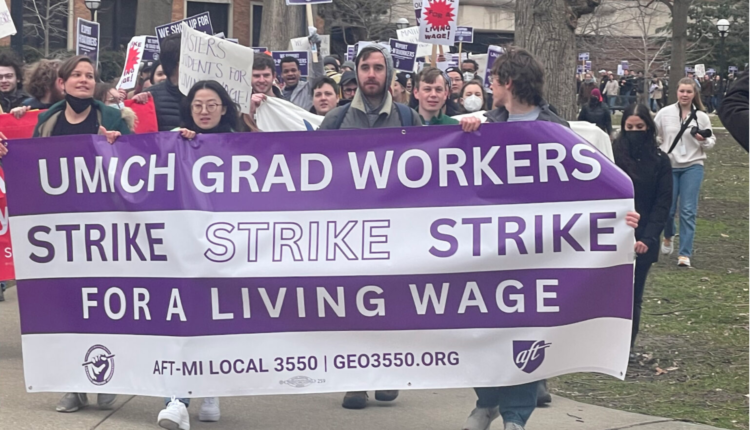U-M Grad Student Instructors on Strike
by Jon King
Members of the Graduate Employees’ Organization (GEO) AFT Local 3550 went out on strike Wednesday, with economic issues the main point of contention.
The union, which is an affiliate of the American Federation of Teachers (AFT), represents Graduate Student Instructors (GSIs) and Graduate Student Staff Assistants (GSSAs) at the University of Michigan.
Union members said their decision to seek a strike action was rooted in the fundamental needs of paying for rent, childcare and health care.
“We love serving our fellow students, but we need pay that allows workers to afford rent and, for those of us with children, to have adequate childcare,” said Jared Eno, GEO president. “Over a period of months, the university has not taken our needs seriously, leaving us with no choice for our members but to withhold our labor. The vote to authorize this strike was 95 percent in favor. That says something about people’s determination to get justice.”
GEO members say current working conditions dictate that graduate students at one of the wealthiest public universities in the nation have to work full-time for part-time pay.
“We keep the university running. And yet, a third of our members are barely able to keep a roof over their heads,” said Ember McCoy, GEO vice president. “You shouldn’t have to be rich to afford to do this job. Everyone should be paid for all the work they do, all the hours we put in. That is basic economics, basic justice and it’s at the heart of making the university serve everyone.”
David Helps, a bargaining team member, said they have spent months trying to get the university to bargain in good faith, noting that student learning conditions are their working conditions.
“We didn’t take this action lightly,” said Helps. “We took it based on our needs as workers, and the need to serve our fellow students.”
Meanwhile, the university filed an unfair labor practice charge against GEO with the Michigan Employment Relations Commission saying that the strike violates the GEO contract that remains in place until May 1. The university also noted that Michigan law prohibits strikes by public sector employees.
Among the claims made by the university in the complaint is that the GEO “has bargained to impasse over several non-mandatory and/or illegal subjects of bargaining under the Michigan Employment Relations Act,” including a demand that the university “fund an unarmed and non-police urgent response program separate from the Division of Public Safety”, a demand the university says does not pertain to the conditions of employment in the GEO bargaining unit.
The university also objects to a proposed “immigration protection” proposal by the GEO that demands that other than instances involving a validly executed search or arrest warrant, the university not cooperate with requests of federal immigration authorities to enter a workplace or inspect records nor comply with requests of federal immigration authorities to inspect pertinent immigration forms and documentation.
“GEO’s bargaining proposal is a non-mandatory and/or illegal subject of bargaining in violation of public policy because it prohibits the University’s voluntary cooperation with federal immigration authorities enforcing federal law; places restrictions on legal compliance by the University in violation of the federal law; and demands legal representation from immigration issues unrelated to University employment,” states the complaint.
The GEO bargaining platform says both of those issues arise out of an “Unaccountable and opaque approach to campus safety,” they say fails to protect union members.
“The University spends over $30 million on policing, security, and surveillance while underfunding offices that prevent sexual assault and provide mental health support,” states the platform. “Due to this, graduate student workers can’t even earn a living wage or access the supports we need to keep ourselves, each other, and our students safe.”
Regardless, Rick Fitzgerald, interim vice president for communications, told the Michigan Advance that the university strongly believes the best place to resolve differences is at the bargaining table.
“The university recognizes the essential contributions of GSIs and GSSAs to our academic community and remains committed to bargaining in good faith with GEO,” he said. “Beyond any legal considerations is an ethical one: if collective bargaining is to retain its value, all parties must honor the terms of the contract they signed. We urge GEO to reconsider its breach of the agreement we reached through good faith collective bargaining.”
Fitzgerald added that they received reports from students and university employees about feeling harassed by strikers gathered near building entrances, calling it “unfortunate.” He said while they affirm the right of any group to advocate for their cause on campus, no one should be made to feel harassed or threatened by protesters.
The next bargaining session is scheduled for Friday, although Fitzgerald said the university remains ready to meet at any time.
Meanwhile, university officials say classes will continue as scheduled, with substitute instructors, alternative assignments and other means being utilized as needed.


Comments are closed, but trackbacks and pingbacks are open.